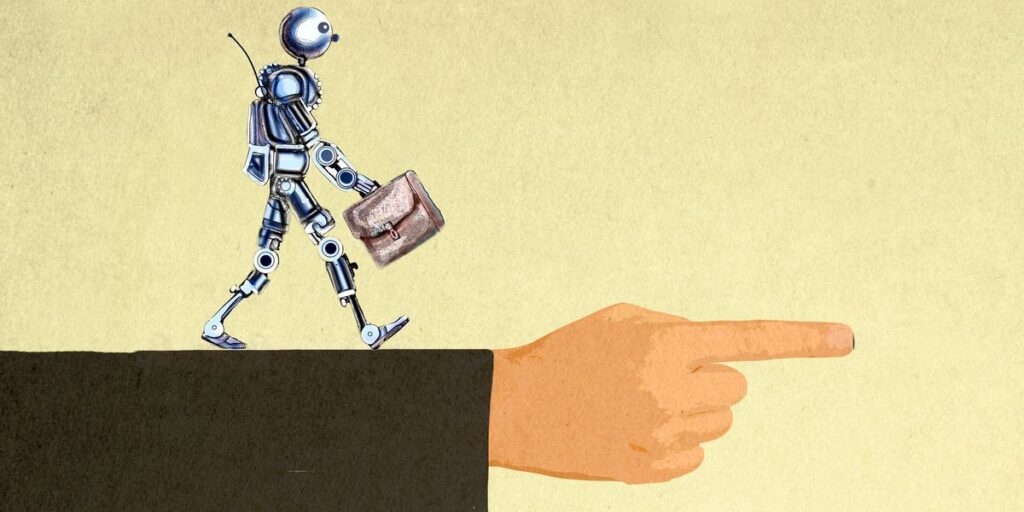- As one economist put it, “AI won't take your job; it's someone using AI that will take your job.”
- While AI will likely be beneficial for many workers, some jobs are at higher risk of being replaced.
- Experts advise upskilling and prioritizing soft human skills as AI permeates the workplace.
You may have heard the phrase, “AI isn't going to take your job, it's someone using AI that's going to take your job.”
Economist Richard Baldwin coined the phrase at the World Economic Forum's Growth Summit in 2023, and variations of the phrase have been mentioned ever since as people discuss the potential impact of AI.
Baldwin told BI he wasn't sure if he coined the phrase, but the message is that AI won't replace humans, but those who embrace it will be given workforce advantages.
In the 12 months since Baldwin shared his views, interest in artificial intelligence has only grown: A recent survey by consulting firm Bain & Company found that 85% of companies surveyed ranked AI adoption among their top five priorities.
As companies ramp up their AI offerings and begin to restructure their workforces, many are beginning to rethink the question of whether AI will eliminate jobs or create jobs.
AI is still in its infancy, but we asked experts for their thoughts: Should we be more worried about humans using AI taking our jobs, or about AI itself taking our jobs?
Workers are already seeing the benefits of AI at this stage
Baldwin said AI is like a lawnmower or a power drill: it makes your job easier, but it won't replace the human behind it. Other experts seem to share a similar view, saying AI isn't advanced enough to function without instructions, and that for the most part, it will help humans do their jobs more efficiently.
Jasmine Escalera, a career coach at LiveCareer, said AI can automate repetitive tasks, “freeing up time to focus on upskilling.”
Matt Betts, research and development leader at leadership consulting firm RHR International, says the system will increase efficiency and allow consultants to focus on more impactful work, like working with clients.
The data shows a similar trend of AI helping many workers. Produce high-quality work In less time.
A 2023 study by MIT and Stanford University found that access to AI increased productivity by an average of 14%, with a 34% impact on new or low-skilled workers. A Morgan Stanley report found that workers with multiple income streams who used generative AI to improve productivity earned 21% more on average than those who did not.
AI might even help people find employment: A March survey of 1,150 U.S. workers by career service LiveCareer found that 85% of job seekers would use AI to save time writing applications, and 40% thought it would improve their grammar, writing skills, and vocabulary.
Some job losses are inevitable
AI has already redefined many roles and will likely replace some jobs, if not all of them.
IBM's marketing chief said the company once had 800 people in its human resources department, but now has 60 because it has been able to automate repetitive tasks.
Klarna appears to be following a similar trajectory: In a February blog post, the company said that as a result of curbing hiring, its AI assistant was doing the work of “700 full-time agents.”
OpenAI CTO Mira Murati He also spoke about the topic at an event at Dartmouth College on June 8, where he drew attention by saying that while some creative jobs may disappear, the jobs that could be replaced by AI “should never have existed in the first place.”
Karl Benedikt Frey, director of the future of work at the University of Oxford, said transport and logistics was likely to become fully automated in the future, with warehousing, manufacturing, reception, cashiering and translation also among the roles heading towards automation or semi-automation.
It's a good idea to improve your skills
March Goldman Sachs The report estimates that more than 300 million jobs worldwide could be affected by AI, but it's impossible to predict exactly how that will change.
Career coach Escalera said the best path forward is to rely on human soft skills as you upskill and “adopt a continuous learning mindset.” AI is becoming a requirement for some companies as they recruit.
TripAdvisor co-founder Steve Kaufer said on “The Logan Bartlett Show” that during interviews he asks candidates if they've tried the new AI chatbot, and said software engineers who haven't tried AI tools often don't get the job.
“I just don't get it,” Kaufer said, “and I probably wouldn't want to work with that guy.”
JB Miller, CEO of global events company Empire Entertainment, said AI is a “must-have new skill,” especially in industries that require improvisation. He said AI can save time and help generate ideas for set design and talent scouting. He asks all new hires what AI tools they use.
“There's no way in the world you can hire someone who doesn't know how to use Excel, who doesn't know how to use the Internet and how to search,” Miller said.
“I think the same can be said about some of these fundamental AI tools,” he added.

